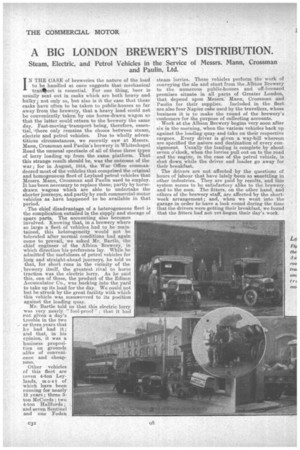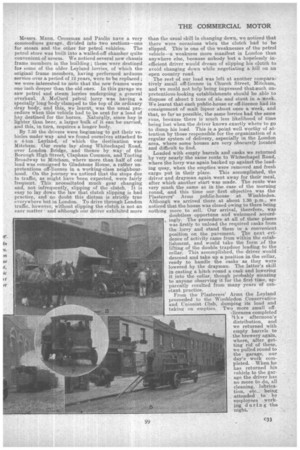A BIG LONDON BREWERY'S DISTRIBUTION.
Page 10

Page 11

If you've noticed an error in this article please click here to report it so we can fix it.
Steam, Electric, and Petrol Vehicles in the Service of Messrs. Mann, Crossman and Paulin, Ltd.
IN THE CASE of breweries the nature of the load to be handled at once suggests that mechanical tranitort is essential. For one thing, beer is usually sent out in casks which are both heavy and bulky; not -only so, but also is it the case that these casks have often to he taken to public-houses so far away from the brewery, that a heavy load could not be conveniently taken by one horse-drawn wagon so that the latter could return to the brewery the same day. Fast-moving'transport being, therefore, essential, .11).ere only remains the choice between steam, electric and petrol vehicles. Due to wholly adventitious circumstances, we recently saw at Messrs. Mann, Crossman and Paulin's brewery in Whitechapel Road the unusual spectacle of all of these three types of lorry loading up from the same platform. That this strange result should be was the outcome of the war ; for in August, 1914, be, War Office commandeered most of the vehicles that comprised the original and homogeneous fleet of Leyland petrol vehicles that Messrs. Mann, Crossman and Paulin used to employ. It has been necessary to replace these; partly by horsedrawn wagons which are able to undertake the shorter journeys, and partly by such commercial-motor vehicles as have happened to be available in that period.
The chief disadvantage of a heterogeneous fleet is the complication entailed in the supply and storage of spare parts. The accounting also becomes involved. Knowing that in a brewery where so large a fleet of vehicles had to be main taineel, this heterogeneity would not be tolerated after normal conditions had again come to prevail, we asked Mr. Bartle, the chief engineer of the Albion Brewery, in which direction his preference lay. While he admitted the usefulness of petrol vehicles for long and straight-ahead journeys, he told us that, for short runs in the vicinity of the , brewery itself, the greatest rival to horse traction was the electric lorry. As he said this, one of these, the product of the Edison Accumulator Co., was backing into the yard to take up its load for the day. We could not but be struck by the great facility with which this vehicle was manceuvred to its position against the loading quay. Mr. Bartle told us that this electric lorry Was very nearly " fool-proof " ; that it had rot given a day's trouble in the two or three years that ha had had it ; and that, in his cpinion, it was a business proposition on grounds alike of convenience and cheap1 less .
Other vehicles of this fleet are i'even 4-ton Leylands, most of which have been running for nearly 12 years ; three 3ton McCurds ; two 4-ton Hallfords ; and seven Sentinel and one Foden steam lorries. These vehicles perform the work of conveying the ale and stout from the,Albion Brewery to the numerous public-houses and off-licensed premises situate in all parts of Greater London, that depend upon Messrs. Mann, Crossman and Paulin for their supplies. Included in the fleet are also four Napier cabs used by the travellers, whose business it is to make the round of the brewery's customers for the purpose of collecting accounts. Work at the Albion Brewery begins very soon after six in the morning, when the various vehicles back up against the loading quay and take on their respective cargoes. Every driver is given a way-bill whereon are specified the nature and destination of every consignment. Usually the loading is complete by about seven o'clock, when the lorries pull out on to the road and the engine, in the case of the petrol vehicle, is shut down while the driver and loader go away for their breakfast.
The drivers are not affected by the questions of hours of labour that have lately been so unsettling in other industries. They are paid by results, and this system seems to be satisfactory alike to the brewery and to the men. The fitters, on the other hand, and others of the brewery staff, are affected by the shortweek arrangement ; and, when we went into the garage in order to have a look round during the time that the drivers were getting their breakfast, we found that the fitters had not vet begun their day's work. Messrs. Mann, Crossman and Paulin have a very commodious garage, divided into two sections—one for steam and the other for petrol vehicles. The petrol store was built into a walled-off chamber quite convenient of access. We noticed several new chassis frame members in-the building; these were destined foP some of the older Leyland lorries, of which the original frame members, having performed arduous service over a period of 12 years, were to be replaced ; we were interested to note that the new frames were one inch deeper than the old ones. In this garage we saw petrol and steam lorries undergoing a general overhaul. A McCurd petrol lorry was having a specially long body clamped to the top of its ordinary dray body, and this, we learnt, was the usual procedure when this vehicle had to be sent for a load of hay destined for the horses. Naturally, since hay is lighter than beer, a larger bulk of it can be carried, and this, in turn, requires a longer body.
By 7.30 the drivers were beginning to get their vehicles under way and we found ourselves attached to a 4-ton Leyland, of which the destination was Mitcham. Our route lay along Whitechapel Road, over London Bridge, and thence by way of the Borough High Street, Clapham Common, and Tooting Broadway to Mitcham, where more than half of our load was consigned to Gladstone House, a rather unpretentious off-licence in a working-class neighbourhood. On the journey we noticed that the stops due to traffic, as might have been expected, were fairly frequent. This necessitated much gear changing and, not infrequently, slipping of the clutch. It is easy to lay down the law that clutch slipping is bad practice, and no doubt this dictum is strictly true everywhere but in London. To drive through London traffic, however, without slipping the clutch is not an easy matter • and although our driver exhibited more than the usual skill in changing down, we noticed that there were occasions when the clutch had to be slipped. This is one of the weaknesses of the petrol vehicle--a weakness more manifest in London than anywhere else, because nobody but a hopelessly in efficient driver would dream of slipping his cluteh to avoid changing down while negotiating a,' hill on an open country road.
The rest of our load was left at another comparatively small off-licence in Church Street, Mitcham, and we could not help being impressed that such unpretentious-looking establishments should be able to dispose of about 2 tons of ale and stout in a week. We learnt that each public-house or off-licence had its consignment of malt liquor about once a week, and that, so far as possible, the same lorries had the same runs, because there is much less likelihood of time being lost when the driver knows exactly where to go to dump his load. This is a point well worthy of attention by those responsible for the organization of a regular system of delivery, especially in the London area, where some houses are very obscurely located and difficult to find.
Loaded with empty barrels and .casks we returned
by very nearly the same route to Whitechapel Road, where the lorry was again backed up against the load ing quay, when the empties were removed and fresh cargo put in their place. This accomplished, the driver and drayman again went away for their meal, after which another start was made. The route was very much the same as in the case of the morning round, and this time our first objective was the Plasterers' Arms public-house at Wimbledon. Although we arrived there at about 1.30 p.m., we noticedthat the house was closed owing to there being nothing more to sell. Our arrival, therefore, was doubtless opportune and welcomed accord
., ingly. The procedure at all of these places was firstly to unload the required casks from the lorry and stand them in a convenient position on the pavement. The next evidence of activity came from within the establishment, and would take the form of the lifting of the double trapdoor leading to the cellar. This accomplished, the driver would descend and take up a position in the cellar, ready to handle the casks as they were lowered by the drayrnan. The latter's skill in casting a hitch round a cask and lowering it into the cellar, though probably amazing to anyone observing it for the first time, apparently resulted from many years of constant practice.
From the Plasterers' Arms the Leyland proceeded to the Wimbledon Conservative and Unionist Club, dumping its load and
taking on empties. Two more small offlicences -completed h e afternoon's distribution, and we returned with empty barrels to the brewery again, where, after getting rid of these, we pulled round to the garage, our day's work completed. When he has returned his vehicle to the garage the driver has no more to do, all cleaning, lubrication, etc.. being attended to by employees working during the night.






















